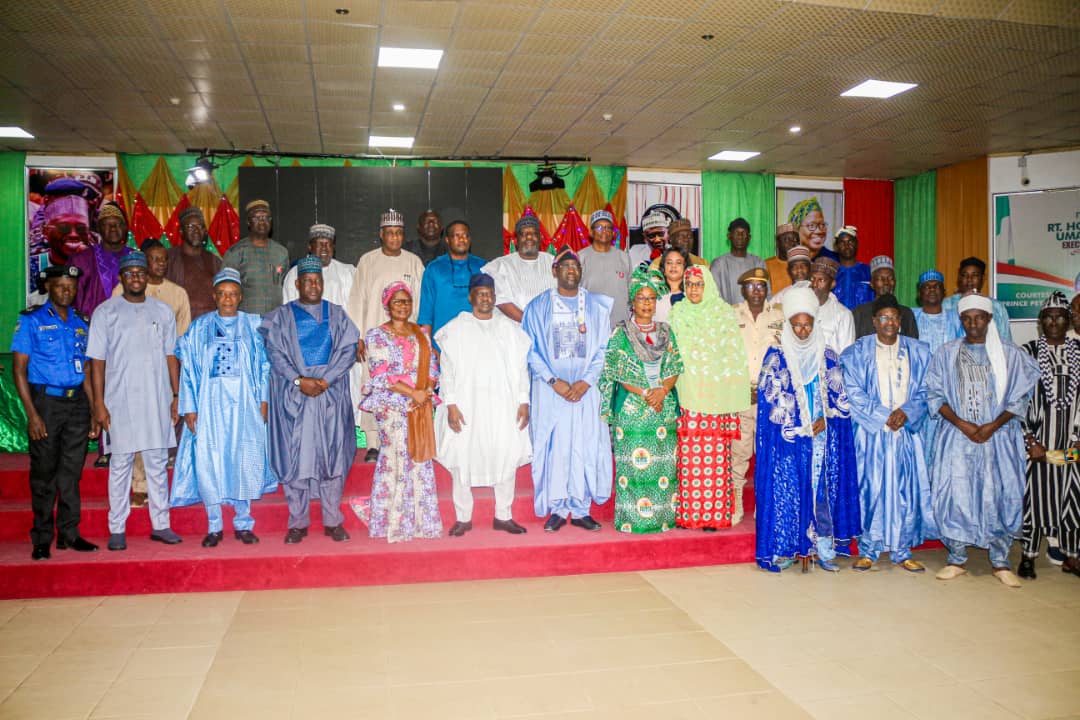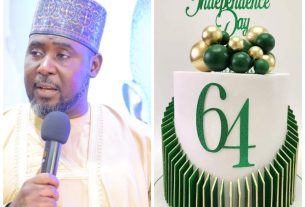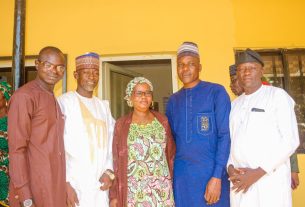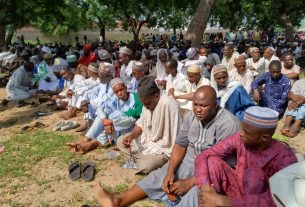It was not much expected that Adamawa State Deputy Governor, Professor Kaletapwa George Farauta would emerge Chairperson of Nigeria-Cameroon Border States Committee at the recently concluded workshop
for creation of Nigeria’s Platform for Local Border Authorities along Nigeria-Cameroon International Boundary held in Yola.
She turned out to be, following an unanimous endorsement by frontline member states consisting of Adamawa, Borno, Taraba, Benue, Cross River and Akwa Ibom.
As it has happened, members believe the move was a deliberate strategy for coherent and concerted efforts to address boundary issues for sustainable peace, security, and development along the Nigeria-Cameroon border.
Thus, she is seen as the right person for the right job as she assumes leadership of the group.
Farauta’s new position would ensure successes of the recently ratified African Union Convention on Cross Border Cooperation.
The Convention, otherwise known as the Niamey Convention, is aimed at paving the way for cross border cooperation at local, sub-regional and regional levels; ensure effective and integrated border management; combat cross border crime, terrorism, piracy, and other forms of crimes and transform border areas into catalysts for growth.
Professor Farauta was quoted to have said: “We are gathered here today to establish a very important platform that would not only serve our collective security interest, but also boost the economy and prosperity of our respective states and pave way for trans-border cooperation between Nigeria and Cameroon.
“Nigeria and Cameroon share a long history, socio- economic ties and cultural relationship that predates the arrival of colonial administration. Communities living along the borders are largely homogenous.
“In that regard, our efforts here will hopefully not only foster peaceful co-existence but also open doors for more opportunities for progress and development.
“As the Director General has rightly highlighted in this welcome address, Nigeria has ratified the African Union Convention on Cross Border Cooperation, otherwise known as the Niamey Convention.
“The convention stressed on the need for member states of the African Union to promote cross border cooperation at Local, Sub National and National Levels. It has provided roles for the Border Local Governments, Border States and of course the country at large.
“Concrete engagements at these three levels would no doubt boost Nigeria’s economic opportunities and further solidify our role as a leading nation in Africa.
“Adamawa State has the longest stretch of international boundary. Out of the 2100kms of the Nigeria – Cameroon Boundary, Adamawa shares about 600km stretch, spanning over nine (9) out of our twenty one (21) Local Government Areas. On the Cameroonian side, we are bordered with three regions, namely; Far North, North and North West regions. This has made us major stakeholders in this cross – border project. Accordingly, as a State, we would do our utmost best in promoting peaceful border regime for the benefits of our people.”
In his speech, Director General National Boundary Commission (NBC), Surv. Adamu Adaji, represented by Barrister Amina Nyako, Director of Research and Policy Analysis of the commission, explained that the workshop was designed to improve trans-border relations between composite regions and Local Border Authorities as well as the Traditional Rulers along Nigeria-Cameroon International Boundary.
“It is a follow-up to the maiden workshop that established a National Consultative Forum for constructive engagement, collaboration and effective coordination of border policies and programmes in order to promote security and economic prosperity of the border regions.
“This workshop could not have come at a better time owing to the rising challenges of insecurity along our borders and the desire for economic cooperation and integration across borders of the African continent.
“It is important to stress here that our collective desire for Nigeria’s security and economic prosperity as well as the well-being of our people is vital.
“The Federal Government places great importance on the role of Border Local Government Authorities and Traditional rulers in the attainment of peaceful co-existence between Nigeria and her proximate neighbours. Their role is not only limited to promoting peaceful co-existence but also facilitating cross border cooperation and regional integration.
“This was the reason why Nigeria recently ratified and deposited the African Union Convention on Cross Border Cooperation on 5th October 2023.
“The Convention otherwise known as the Niamey Convention, is aimed at paving the way for cross border cooperation at local, sub-regional and regional levels; ensure effective and integrated border management; combat cross border crime, terrorism, piracy, and other forms of crimes and transform border areas into catalysts for growth, socio-economic and political integration of the continent and the deepening of its unity. This can only be achieved successfully when a Local Border Platform is created.
“During the 4th Conference of African Ministers responsible for Border Management which was held in October 2016 in Addis Ababa, Ethiopia, it was unanimously agreed that Africa’s peace and security are directly intertwined with good border governance and the attainment of sustainable development in the borderlands. Border State Governments and Border Local Governments that are far from National Capitals have a critical role because of their proximity to the borders and borderlands.
“Let me inform you that both the African Union (AU) and the Economic Community of West African States (ECOWAS) underscored the importance of sub-regional engagements between composite regional and local authorities.
“With particular reference to the African Union, the fifth Pillar of the African Union Integrated Border Governance Strategy was engagement and development of borderlands. This is considered to be critically important in addressing our security challenges and opening doors of opportunities for trans-border economic cooperation.
At the ECOWAS level, there is a deliberate policy for moving away from ECOWAS of States to ECOWAS of People. Many trans-border economic corridors between composite border regions were developed under the ECOWAS framework for cross border cooperation.
“It is pertinent to inform this gathering that Nigeria has about 4500km land border and around 850km stretch of maritime border.
Providing effective policing across the length of this expansive territorial borders would no doubt require not only the commitment of our combined security operatives but also the support of our local border authorities and borderland communities who are the main gateways to our nations. This clearly explains that the work of securing our territorial borders must be a collective responsibility and all hands must be on deck.
“Your Excellencies, the Chairmen of State Boundary Committees, Honourable Commissioners, Chairmen of Border Local Governments and our respected traditional rulers, your engagement with your counterparts in the neighbouring countries would no doubt assist in cross border development initiatives that would proffer on the spot solution to some rising security challenges along the borders and strengthen opportunities for cross border economic development.
“The development of this important platform will be replicated across all frontiers of Nigeria, and it is our hope that it will be a veritable platform for translating the decisions of the Border Governors Forum into concrete actions and also serve as a vehicle for regular engagement between our local authorities and traditional institutions with their counterparts in the proximate countries.”
The Comptroller General (CG) of the Nigerian Immigration Service (NIS), Wura-Ola Adepoju, represented on the occasion by Hakeem Bello Deputy Comptroller Adamawa, remarked: “This is a special honour given to me to make a speech on this historic opening ceremony for the creation of platform for Local Border Authorities Along Nigeria – Cameroon International Boundary, having known that Nigeria Immigration Service is saddled with the responsibilities of manning our borders effectively as the gate keepers of the nation.
“As such you may wish to appreciate the fact that Adamawa State has about 712km borderline without clear demarcation of the boundary between Adamawa – Cameroon borders as well as in some other States like Taraba, Borno, Benue, Cross River and Akwa Ibom.
“Therefore, to address Local border issues such as conflicts on the location of boundaries, trans-border security challenges, development of cross border joint projects and other activities that will promote peaceful co-existence between border communities at the borderline will reduce or eradicate Stateless Persons who do not fall within Nigeria or Cameroon Republic due to improper border demarcation.
“No doubt, this will create the platform for Local Border Authorities Along Nigeria – Cameroon International Boundary which will equally bridge the gap between irregular migrations and cross border trade crimes between the two countries.
“The Nigeria Immigration Service is tasked with the responsibilities of protecting the expansive borderlines as well as the territorial integrity of the nation. This will go a long way in checkmating cross border crimes, such as smuggling of migrants, trafficking of persons, banditry, kidnapping, etc, where hoodlums seize the advantage of hiding at the communities where there is no clear demarcation of borderline.
“Also in terms of joint projects and developmental incentives could not be clearly cited at the right place. So there is need to promote positive relationship between neighbouring States when it comes to peace and security; borders are a priority aims for structural prevention of conflicts.
“There are also deposits of natural resources along the border. This could be a cause for conflicts in countries which have not yet fully delimited and demarcated their borders.
There is need to reinforce regional cooperation, resources sharing, implementation of joint activities (like Seme-Kranke Joint Border Crossing Point between Nigeria and Benin Republic) to facilitate the development of border communities and to ease free movements of persons, goods and services to promote socio-economic activities that exists since time immemorial. This will no doubt strengthen the African Continental Free Trade Agreement.
“You may wish to appreciate the fact that conflict is inevitable as long as people exist although, it could be managed through enhanced dialogue-centered conflict prevention and resolution to make peace a reality for all people at the Contiguous Communities. However, it is worthy of note that the inauguration of this platform, the Nigeria Immigration Service can synergize and work jointly with the Committee to enhance and strengthen the security at the borders.
“Let me use this opportunity to thank the members of the States Boundary Committee Along Nigeria – Cameroon International Border for a tremendous work with dedication and professionalism they exhibited under the Chairmanship of Her Excellency, Prof. Kaletapwa G. Farauta, Deputy Governor and Chairperson of Adamawa State Boundary Committee.
Barr Sama Ode, Deputy Governor/Chairman Benue State Boundary Committee, said, “This workshop by the National Boundary Commission for the Creation of Nigeria’s Platform for Local Border Authorities along the Nigeria – Cameroon International Boundary could no have come at a better time. This is because from briefs by my Boundaries Commissioner, one of the rcommendations from the workshop that was organized by National Boundary Commission on the National Consultative Forum for Chairmen of State Boundary Committees of Nigeria’s Border States held in Abuja on 12th October, 2022, was that committees for Local Border Authorities would be established.
“These committees were to implement the decisions of the National Consultative Forum (NCF) for Chairmen of State Boundary Committees of Nigeria Border States and all relevant Federal Government Agencies. National Boundary Commission is therefore commended for putting together this workshop as a follow up.
“During this era that Nigeria is experiencing a lot of insecurity, transborder crime, insurgency, kidnapping and banditry along her international borders, there is every need for Cross Border cooperation between composite regional and Local Authorities in order to curtail these vices. Creation of the Traditional/Local Authorities platform will no doubt add value to the promotion of peace, security and regional integration.
“Since National Boundary Commission has called us together for this one day workshop, I am convinced that the Local Border Authorities platform when constituted at the grassroots’ level, will directly translate resolution/decisions arrived at by the National Forum for Chairmen of States Boundary Committee into reality. In Benue State, Kwande is the only Local Government Area that shares boundary with the Republic of Cameroon.
“Due to the rugged and mountainous terrain coupled with absence of motorable roads, transportation poses a very big challenge on this border. There is also no security presence on the Benue side of this border. This makes the border very porous and prone to a lot of activities of insecurity. It is the prayer of Benue State Boundary Committee that the National Boundary Commission take note of this and make a case for Benue before the relevant Federal Government agencies.
“Let me seize this opportunity to appreciate the National Boundary Commission on the efforts so far made in the demarcation of Benue/Cross River and Benue/Nasarawa Interstate Boundaries.
Benue State Boundary Committee wishes to humbly appeal that work on these boundaries should be resumed as soon as possible to complete the demarcation exercise.
“Also there is need for the National Boundary Commission to consider the demarcation of the Benue/Ebonyi and Benue/Taraba Interstate Boundaries that witness skirtmishes from time to time.”
COMMUNIQUE ON THE WORKSHOP
“In line with the recommendations of the National Sensitization Workshop on the African Union Integrated Border Governance Strategy (AUBGS) and the African Union Convention on Cross Border Cooperation held in Abuja on 17th March, 2022, the Workshop for the Creation of Platform for Local Border Authorities along the Nigeria-Cameroon International boundary was held in Yola, Adamawa State on 13 December, 2023.
“The workshop was declared open by the Executive Governor of Adamawa State, Rt. Hon. Ahmadu Umaru Fintiri. It was attended by the Deputy Governor of Adamawa State, Prof. Kaletapwa G. Farauta; the Deputy Governor of Taraba State, Alh. Aminu Abdullahi Alkali; the Deputy Governor of Benue State, Barr Sam Ode; the Deputy Governor of Borno State Umar Kadafur Usman, represented by Hon. Tukur Ibrahim Mohammed Commissioner of Inter-Governmental & Special Duties, the Deputy Governor of Cross River State, Rt. Hon Peter A. Odey represented by Surv. Patrick Bassey, Surveyor General of Cross River State, the Deputy Governor of Akwa Ibom State, Sen. Dr. Akon Eyakenyi represented by Dr. Mrs. Grace P. Jim, Permanent Secretary Office of the Deputy Governor Akwa-lbom State.
“The Workshop was convened by the Director General National Boundary Commission (NBC), Surv. Adamu A. Adaji represented by Barr. Amina Nyako, Director Research and Policy Analysis NBC. Other Federal Government Agencies in attendance include the Border Communities Development Agency (BCDA), Nigeria Immigration Services (NIS), the Department of State Services (DSS) and the Nigeria Police Force (NPF). Also, in attendance were the Traditional Rulers along the Nigeria-Cameroon international boundary.
“The following recommendations were made:
The need for the establishment of a platform for the Deputy Governors/Chairmen of State Boundary Committees along the Nigeria-Cameroon international boundary.
The urgent need for the selection of Chairmen of the Local Border platforms in each of the border States as well as Chairman of the Local Border Authorities for the entire Nigeria-Cameroon international boundary for effective coordination.
The need for the new platforms in each of the States to have an integrated membership that comprises Chairmen of the border Local Governments, Traditional rulers, Representatives of the various Security Agencies, Youth and Women Leaders and Farmers and Herders Associations in the border areas.
The need for the selection of the Chairmen for the Traditional Rulers and Surveyor Generals of the State for effective coordination.
The need for the hosting of this workshop bi-annually to review the progress of the platform and report back to the National Consultative Forum (NCF) for Chairmen of States Boundary Committees of Nigeria’s Border States.
The platforms should strategize on ways of enhancing cross-border security and combat cross-border challenges to prevent illicit activities along the border states.
That the National Boundary Commission would serve as the coordinating secretariat for all the platforms.”
The workshop ended on a note emphasizing the necessity for coherent and concerted efforts to address boundary issues for sustainable peace, security, and development along the Nigeria-Cameroon border.
By Hussaini Hammangabdo, Press Secretary to Adamawa Deputy Governor




